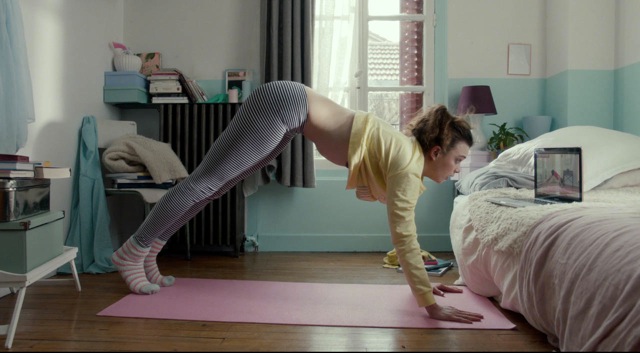Lunch with Oh Oh Chéri
Interview with Lola Roqueplo, director of Oh Oh Chéri
Why did you choose this nod to Françoise Hardy?
At first, I entitled the film after a song by Françoise Hardy for quite a silly reason, because I was attracted to the physical sound of the words.
Later, when I thought about the song, I envisioned the story of a girl who’s in love with a wretched guy – “You can even dance in your pyjamas, and when you take things out on me…” – who projects all her expectations onto something that doesn’t exist. I think that, in reality, the script for the film is tied closely to what I imagined when listening to the piece.
But more generally, most of the music, as well as the clothes and colors, hark back to the Yéyés. That period fascinates me – In fact, I’m working on a television series about it! – because it evokes a sort of sweet, pop flavor. It was a time when youth reigned supreme, but in the midst of a dark period marked by the Algerian war. That’s what I tried to do with Oh Oh Chéri – make a bittersweet candy.
What interested you about your character’s age group?
I was fed up watching movies with fragile, wilting girls who are the stuff of fantasies. As if women were goddesses and not real human beings. What I wanted to see were girls like my girlfriends, who are sometimes awkward, but don’t have complexes about their bodies. And when they masturbate in the shower it’s not like an ad for shower gel. As a result, the characters are the same age as my girlfriends.
Is her adult self-sufficiency something she’s recently gained, or did you imagine it as more like a “premature” freedom?
As for Eva’s independence, I wanted to talk about a character who was defined by a sort of modern, permissive education. That I myself am a product of. (My mother is really not going to like this interview!) Eva’s mother lets her do as she pleases. She tells her about her love life, and almost expects Eva to give her support like a friend. I actually think that Eva’s mom has a more intense life than Eva! But then she turns around and becomes mom again when it suits her. That’s why Eva needs John’s and the other boys’ affection so badly, as well as her best friend Marion’s stern, almost authoritarian hand. There are also some good things too: Eva is clearly free to make her own emotional and sexual choices, and I imagine that her relationship with her mother is probably pretty fun on a daily basis.
What place do you think impulsiveness and dynamism play in chlidhood?
At the risk of sounding naive, this was my first time making a film. So I was an impulsive child. All of the pacing in the film comes from my burning desire to take hold of the camera and begin filming.
What did you find amusing about our relationship to electronic technology – text messages, emoticons, gifs, using technology as a guide, the fact of situating the film in a particular time period…?
I think computers, cellphones and other things pose important questions for staging a contemporary story. How do you not break the rhythm with an insert? What can you do to make sure the film doesn’t seem outdated in a few years? How can you make intentions clear when they go beyond simple exchanges of information? At the same time, this opens up vast possibilities for experimentation that have barely been explored. I don’t know if I’ve gone quite that far, but I wanted to try my hand at it, since the film lent itself to that.
Why did you choose to depict a mother-daughter relationship? And what interested you about the absence of a father?
Well, actually, I originally wanted to attack my mother straight on and settle scores with her onscreen. Unfortunately, she didn’t really get that it was about her, so I decided to use her name for the mother figure in my next film. No, I’m kidding. Or am I? No, seriously, I wanted the character Eva to be surrounded only by women and for the only men who cross her path to make her unhappy. I think the absence of a father allowed me to focus better on her relationship with her mother. I like that it’s an extremely close relationship, and that that very closesness sometimes leds to cruelty, on both sides.
Any cinematic coups de cœur in the past year you’d like to tell us about?
Baden Baden by Rachel Lang and Toni Erdmann by Maren Ade! It’s curious since they both have the same energy.
If you’ve already been to Clermont-Ferrand, could you share with us an anecdote from the festival? If not, what are your expectations for this year?
This is my first time at Clermont-Ferrand and I’m really excited. And I also just found out that Nine Antico is part of the Lab Jury and I love her comics. I hope she’ll sign one of her books for me!
Oh Oh Chéri is being shown in National Competition F2.








